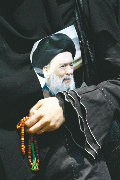DEARBORN — It’s been a week of mourning and remembrance for many in the Middle East and also locally in the wake of Sunday, July 4th’s passing of top Shi’a Muslim cleric Ayatollah Mohammed Hussein Fadlallah in a Beirut hospital due to internal bleeding, a condition for which he was admitted in June. Fadlallah was 74 years old.

|
| A Lebanese Muslim woman follower of Grand Ayatollah Sayyed Mohammed Hussein Fadlallah carries his picture during his funeral in Beirut’s suburbs July 6, 2010. Fadlallah was buried on Tuesday, mourned by hundreds of thousands who paid homage to one of Shi’a Islam’s highest authorities. REUTERS / Khalil Hassan |
Among the stops on the emotional procession were the Imam Rida Mosque in the neighborhood of Bir el-Abed, a place where Fadlallah gave numerous sermons and lectures in the 1980s, and a spot nearby where he managed to avoid a 1985 assassination attempt via car bomb. The attempt left about 80 people dead and was widely believed to be the work of the CIA according to research done by Pulitzer-winning American journalist Bob Woodward. The U.S. has denied involvement in the incident.
Back in metro Detroit, various mosques held nightly prayer services and commemoration events for Fadlallah. Joint commemorations and prayers were expected to be held on Friday at 8 p.m. at the Islamic Center of America in Dearborn, at 6 p.m. on Saturday at the Islamic Institute of Knowledge in Dearborn along with a dinner, and at 5 p.m. again on Sunday at the Islamic Center of America in a joint memorial service featuring Ambassador of Lebanon to the United States Antoine Chedid. The Islamic House of Wisdom in Dearborn Heights also held commemorations and prayer services earlier in the week.
Imam Mohammad Ali Elahi spoke about Fadlallah’s legacy.
“He was a great scholar with more than one hundred books and thousands of lectures, papers, presentations and conferences, and a man of great wisdom, knowledge, leadership, and spirituality,” he said.
“He will be remembered for his many contributions to both Muslims and non-Muslims and he was loved by many but at the same time misunderstood by some people.”
Fadlallah was a strong proponent of the resistance movement in southern Lebanon against Israeli occupation of Arab lands and a critic of U.S. foreign policy’s favoritism of Israel in the region. He widely questioned the U.S.’ stance on Arab-Israeli conflicts, saying that the U.S. “had not taken a single neutral position” in a 2009 interview with the Wall Street Journal.
He was a spiritual guide to Hizbullah at its inception in 1982, although never having a role with the organization and was placed on a ‘black list of terrorists’ by the U.S., endorsing some of Hizbullah’s activities but condemning suicide bombings against civilians such as 2010’s Moscow subway bombings.
He also decried the September 11, 2001 attacks against the U.S. and wrote a letter to U.S. President Barack Obama accusing the country’s policies of “contributing to the loss of the Palestinian cause.”
Fadlallah created and managed a network of charities in Beirut and southern Lebanon, establishing schools and orphanages in those areas.
He also had a passion for women’s rights, describing them as equals and urging them to defend against domestic violence while issuing a ruling banning female circumcision.
Conservative Islamic scholars often disagreed with his moderate views, however, and his politics were criticized by many in the West.
Many local Muslim leaders continued to mourn his loss while remembering his teachings and contributions to the poor along with society in general.
“His passing away affected literally hundreds of thousands if not millions of people across the globe, his passing is the reason why people were sad and I was among them of course because of the great things he did to communities and his great knowledge and understanding with his moderate views on certain issues,” said Imam Mustapha ElTurk of the Islamic Organization of North America in Warren.
“The remarkable thing is he always called for unity among the Sunni and Shi’a and that was his passion actually, one ummah united.”
Sheikh Baqir Berry of the Islamic Institute of Knowledge echoed the importance of Fadlallah’s message of unity among Muslims.
“He managed to bring up the true explanation of Islam,” he said.
“His message was a peaceful message of unity among Muslims themselves, Sunni and Shi’a, along with Christians as well, people of the book as he said, to really help us build balance and bring about peace with justice along with cooperation for the good of humanity,” he said.
Imam Mohamed Mardini of the American Muslim Center in Dearborn spoke about Fadlallah’s dedication to education among other causes.
“First and foremost he was an icon of education of the people of Lebanon, he was an intellectual who brought up the essence of unity and uplifting peope and helped them concentrate on getting together to promote the common interest of humanity,” he said.
“He helped the people in every social and religious arena and he will be remembered for his great legacy in helping all of the Lebanese people.”
One attendee of the Islamic House of Wisdom services, Mohamed Ali of Dearborn, met Fadlallah on a trip to Lebanon in January, one that he said he will always remember.
“He inspired me, he was like a father figure to me and I admired the way he took care of orphans and fed the poor and the homeless,” he said. “When I shook his hand I felt holy, he helped all of Lebanon and it’s like a part of me is gone now that he died.”






Leave a Reply